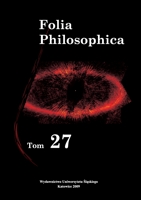Aprioryczny wymiar filozofii kultury w perspektywie nowego humanizmu Ernsta Cassirera
The a priori dimension of the philosophy of culture in the perspective of Ernst Cassirer’s new humanism
Author(s): Anna MusiołSubject(s): Philosophy
Published by: Wydawnictwo Uniwersytetu Śląskiego
Keywords: Cassirer Ernst; Neo-Kantianism; Marburg School; apriorism; humanities
Summary/Abstract: Ernst Cassirer is nowadays thought to be one of the most distinguished representatives of Marburg School of Neo-Kantianism created mainly by Cohen and Natorp, in which not only the return but also going over Kant’s thought is called for. Neo-Kantianism leaves its mark especially on the first period of Cassirer’s philosophical activity, in which the a priori form along with the categories of mind determine the active character of mind and thus inform Cassirer’s analytical method. His convictions are confirmed by one-sided, rooted in Kant and Cohen, interpretation of the gnoseology, which depicts insufficiency of human mind and thus the necessity of not only logical structures of thinking, but also entirety of human spirit, including its constitutive attributes — motivation, feelings and will — being involved in the process of cognition. Hence, the range of Cassirer’s apriorism, which so far has involved only the activity of human mind, now involves also the emotional sphere of human agent. Inspired by Kant, Cassirer develops the symbolic forms a theory. Hence, it is important to notice the influence of, as Andrzejewski calls it, “the methodology of knowledge of feeling and human interests” taken from Giambattissta Vico, Goethe, Schiller and the Johann G. Herder’s semiotic of soul. And rationalized mathematical sciences appear to be a contribution to the reflection on Kulturwissenschaften, which makes Cassirer one of the anti-naturalists.
Journal: Folia Philosophica
- Issue Year: 2009
- Issue No: 27
- Page Range: 179-193
- Page Count: 15
- Language: Polish

